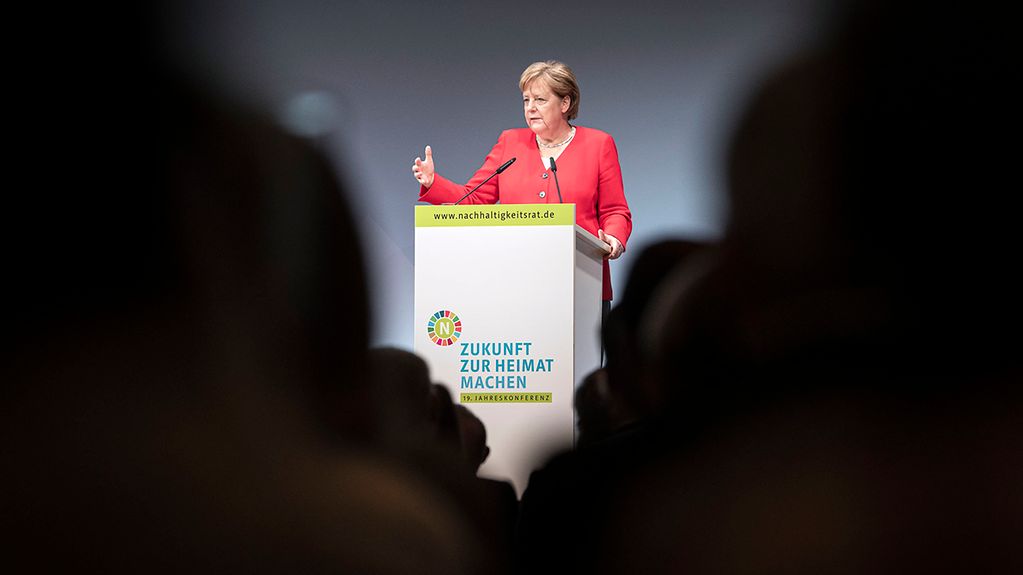German Council for Sustainable Development
“Progress is too slow” on achieving the United Nations 17 Sustainable Development Goals, said Chancellor Angela Merkel at the annual meeting of the German Council for Sustainable Development in Berlin.
5 min reading time

German will do all it can to achieve its own climate targets by 2030
Photo: Bundesregierung / Bergmann
At our current rate of progress it will be impossible to achieve the goals by 2030. The Chancellor deplored the fact that the number of hungry people in the world has risen. And not all people have access to basic sanitation.
Greenhouse gas emissions and consumption of raw materials continue to rise around the globe, she added, and reminded her audience that we have fewer than 4,000 days until 2030.
Germany has a special responsibility
Germany is working actively to realise the 17 Sustainable Development Goals at both national and international level. Along with all other states, the Federal Republic of Germany will be working for the ambitious realisation of these goals at this year’s United Nations Sustainability Summit in New York.
In addition, the German government intends to use Germany’s Presidency of the Council of the European Union next year to make progress on European sustainability targets. To this end a European implementation strategy is to be devised, reported Angela Merkel. Germany will take over the rotating presidency in the second half of 2020.
Germany to be climate neutral by 2050
Climate change mitigation is part of the environmental dimension of sustainability. Relevant measures are explicitly laid out in SDG 13. The Chancellor underlined the importance of climate action for the entire population of the world, and pledged that Germany will do everything possible to achieve its own climate targets by 2030.
By 2030 Germany aims to reduce its greenhouse gas emissions by 55% of the 1990 levels. By 2050 the country intends to be climate neutral. That means that by 2050 emissions of greenhouse gases are to be minimal. Greenhouse gases like carbon dioxide and methane are responsible for global warming and climate change.
The consensus achieved by the “Coal Commission” to end the use of coal in power generation by 2038, was a massive feat, said Angela Merkel. This decision will make it possible to achieve Germany’s climate targets by 2030.
In this context, the Chancellor welcomed the engagement of young people demanding climate action. It is good that young people are getting involved in political debates, she said, and that they are working for more climate action.
The “Climate Cabinet”
Chancellor Angela Merkel established the “Climate Cabinet”, chaired by her, to deal exclusively with issues related to climate action. Several Cabinet ministers are members, and are called on to adopt concrete measures.
Both sector-specific measures (e.g. to cut greenhouse gas emissions in the transport and building sectors) and CO2 pricing measures are thinkable. CO2 pricing involves putting a price on emissions of carbon dioxide in order to minimise the consequences of global warming.
By this September, said the Chancellor, the fundamental decisions will be taken.
Developing renewables – a contribution to climate change mitigation
The expansion of renewable energy, such as wind and solar power, is a major contribution to becoming independent of fossil and finite fuels, like oil and coal. Their use has been consistently expanded in Germany.
Today, more than one third of the kilowatt hours of power used in Germany comes from solar or wind energy, from hydro-power or from biomass.
The Chancellor also pointed out, however, that there is not always broad acceptance for new wind turbines or power transmission lines. We must consider, she continued, whether there should be a form of “special assistance” in rural areas to raise acceptance of renewables.
Sustainability in budget policy
Sustainability is not only an environmental issue though. Financial management too can and must be organised on a sustainable basis. That is why the precautionary principle is important in this sector too. And that means not spending more than we earn.
This is the maxim of the budget policy of the German government. Existing financial resources must be invested to a greater extent in green financial instruments, declared Angela Merkel, i.e. in investment that results in sustainable development, such as protecting forests or clearing the plastic waste from our oceans.
Broad participation in the elaboration of the National Sustainable Development Strategy
Germany’s National Sustainable Development Strategy is one of the most comprehensive in the world. It has been in place since 2002. Since 2016 it has been geared to the imperatives of the 2030 Agenda for Sustainable Development and the 17 Sustainable Development Goals (SDGs). Every four years, it is updated and revised. This year and next year there will again be five dialogue conferences held across Germany.
Because sustainability policy is a complex, inter-sectoral task, it makes very special demands in terms of coordination and cooperation among the federal states and local authorities. The Chancellor announced a relevant meeting with state premiers to be held on 6 June.
Civil society organisations and scientific and research facilities are also involved in the government dialogue on the design and realisation of the National Sustainable Development Strategy.
“We must first put our own house in order”
The Chancellor stressed the fact that public authorities must act as role models for sustainable development. A programme of measures has been launched for about 120 public authorities with a total workforce of around 500,000. It lays out directives for sustainable activities and covers, for instance, buildings, canteens, sustainable procurement and mobility.
Ensuring a balance between family and professional commitments and gender equality in executive positions are also part of the programme.
Incorporating the principle of sustainability in the Basic Law
Chancellor Angela Merkel declared herself open to a discussion about anchoring the principle of sustainability in the German Basic Law or constitution. This would not, however, automatically solve the problems, she pointed out. It would have to be followed by the necessary steps.